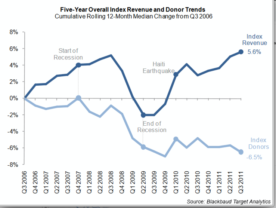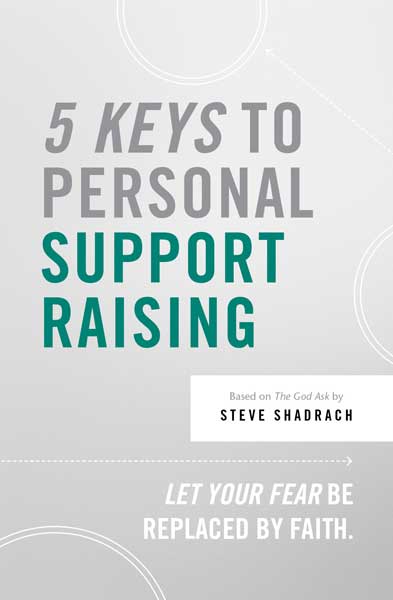Everyone has an opinion and advice on what to do about the Coronavirus Pandemic. Even ISIS has weighed in, warning its followers to stay away from Europe so they don’t get infected.
Here at The Agitator we’re focused on the effects the pandemic will have on fundraising in hopes we can offer some helpful insights, advice and additional resources. To that end last week we issued the first of what will be a series of Agitator Updates –information over and above our scheduled posts– and we’ll continue to send them to all readers via email.
Over the weekend we touched base with lots of veteran fundraisers and analysts including the entire team of behavioral scientists and donor experience experts at DonorVoice. Our goal in reaching out in preparing today’s post was to put the pandemic into perspective.
First Some Context and Some Facts
Clearly, this pandemic of 2020 is not the same as the economic meltdown that led to the Great Recession of 2007-2009. However, there are some analogies and I believe they’re helpful in maintaining perspective.
The first person I contacted was Steve MacLaughlin, author of Data Driven Nonprofits and VP of Product Management at Blackbaud. I asked him to give us an overview of what happened in the Great Recession. Here’s the chart he provided.

This chart represents giving transactions evaluated from 80 organizations, including over 37 million donors and more than 80 million gifts totaling over $2.4 billion in revenue. To be clear, these are primarily large organizations in the United States and trends among mid-sized and smaller nonprofits may be different.
A few of Steve’s observations and comments follow. ( I’ve italicized some passages to add emphasis.)
Giving Lags Changes in Economic Conditions: The data shows that charitable giving lags extreme changes in economic conditions. Charitable giving in the US remained positive more than 12 months after the start of the last recession. There was not a measurable drop in giving for over 9 months following the start of the last recession. Giving is resilient and we are unlikely to see significant changes in giving right now and speculation is unhelpful guessing.
Existing Donors Remain Loyal: The data shows that existing donors were retained at similar levels well into the last recession. The declines in new donors were cancelled out by increased giving from loyal donors. This is not sustainable long-term, but an unknown factor is the impact of decreased investment in donor acquisition and retention. Nonprofits should be mindful not to overreact in times like this and continue to invest in revenue programs that produce results.
Fortune Favors the Prepared: The prescription of social distancing will certainly cause challenges for in-person fundraising activities. Charities well-versed in digital fundraising events have prepared themselves for situations like this. We already know that donors go online first during episodic events and this is something every charity can prepare for now. Continue to engage across multiple channels and optimize on decreasing the distance between donors and their impact.
The Danger of Silence. The Tragedy of Overreaching.
In times like these organizations are faced with choosing one of three fundraising strategies: [For a fuller explanation of the pros and cons of these approaches see Mal Warwick’s classic Fundraising When Money Is Tight.]
- Defensive Approach. Pull in your horns. Save money. Cut or reduce acquisition. Lay off staff. Stop acknowledging gifts and taking regular or extra steps to communicate with donors. Remain silent about the coronavirus; after all it’s not in our mission or range of programs.
- Aggressive Approach. Go for broke. Now’s the time to be really creative.To test new approaches. To pull out all the stops including massively increasing acquisition. Why bet the farm? Because this pandemic and the damage it’s doing to the folks we serve is exactly in our wheelhouse and we simply have to pull out all the stops.
- Selective Approach. This Goldilocks approach is likely to prove the most beneficial to the greatest number of organizations. Organizations who have no direct connection with disease or humanitarian efforts should not avoid mention of the pandemic and what it is doing to your organization. At this point your ‘silence’ only contributes to your irrelevance. Mention the effect of the pandemic on your fundraising and remind your donors that your work must continue. Step up your communications and outreach to donors. Don’t cut your acquisition efforts until it’s clear they’re really not working. The alternative is to doom future revenue for years to come.
Organizations with a direct mission connection to the effect of the pandemic on their work must be front and center. Let your donors know what you’re doing and why their extraordinary help at this extraordinary time is absolutely necessary. (You’ll find some suggestions for how and why to do this in a section below.
Now—right now—is the time to make/modify your fundraising plans for the months ahead. Decide whether you’re going to take the Defensive, Aggressive, or Selective path, put detailed plans and metrics in place then swing into action.
ONE THING IS CERTAIN. THIS IS NOT THE TIME FOR THE BOARD AND CEO TO BURY THEIR HEADS IN THE SAND. “SOCIAL DISTANCING” DOES NOT MEAN “LEADERSHIP INACTIVITY”
The Power of Donor Agency
Why the run on toilet paper and the rows and rows empty paper towel shelves? Because hoarding toilet paper, paper towels, and heaven-only-knows what other items help folks overcome the feeling of powerlessness in times like these. Squeeze an armful of Charmin and feel better.
If there’s one thing that Kiki and Stefano, the behavioral scientists at DonorVoice make clear, is that now is the time to give donors the opportunity to practice personal agency—the essential feeling that the individual is in control.
AND… you and your organization are well-positioned to offer that opportunity.
Some examples….
- Ask them to volunteer to set up a Go Fund Me Page to help one of your beneficiaries or one of your programs.
- Ask them to volunteer as a team leader in a Peer-to-Peer fundraising effort.
- Ask them to help take the sting out of the loneliness of ‘social distancing” by telephoning and checking in on some of your older donors while thanking them for their support.
Don’t Assume Donor’s Won’t Give
So far, every report we’ve received from organizations who’ve gone to their donors in this crisis are experiencing better than expected results. This is especially true for organizations dealing with homelessness, hunger and medical issues. But, it’s also true for cultural organizations who are taking the time and reaching out to their donors explaining how the pandemic is negatively affecting them (cancelled events, diminished ticket sales, etc) and seeing their donors rally to the cause with additional help.
In short, donors are exercising their agency—regaining their power of individual control—by helping a cause they care about at a time when their help is especially needed.
The danger of assuming what a donor is likely to do or not do is especially profound where major gifts are concerned.
If I’ve heard it once, I’ve heard it a dozen times in the last week: “The stock portfolios of our major donors have been decimated. They won’t give! And we’re not going to put them in an embarrassing position by asking.”
Why on earth would knowledgeable major gifts officers take it upon themselves to assume what a donor will or won’t do? Do you really know the state of their finances and assets, not to mention their mindset, that well? I doubt it.
Now’s the time to be in more frequent touch with major donors, letting them know what your organization is up to… how you’re dealing with the pandemic…and especially letting them know what SPECIAL OPPORTUNITIES exist because of this crisis.
- What about a MATCHING GIFT CHALLENGE to spur giving at this critical time?
- What about meeting the cost of a telephone town meeting of all our supporters?
- What about funding the cost of our emergency communications program for the next six months?
Out of crisis springs opportunity. Don’t assume the best of your donors won’t help you seize the moment.
AND…regardless of your organization’s mission the moment to seize is Coronavirus now…Coronavirus tomorrow…and Coronavirus into the foreseeable future.
Roger
View original post at agitator.thedonorvoice.com.

